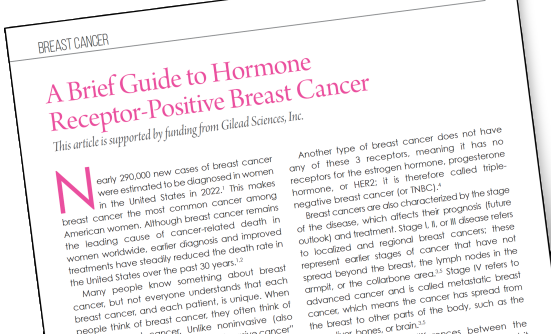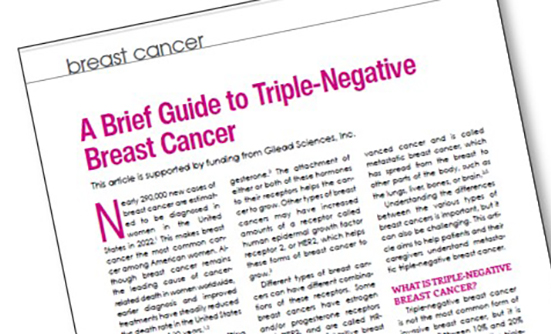Patients with triple-negative breast cancer (TNBC) who received the immunotherapy Imfinzi (durvalumab) before receiving chemotherapy had improved outcomes and lived longer than patients who didn’t receive durvalumab, according to the results of a clinical trial presented at the 2021 ASCO Annual Meeting.
Triple-Negative Breast Cancer
The “triple-negative” in TNBC means that it is breast cancer that does not have estrogen receptor (ER), progesterone receptor (PR), and the HER2 protein, 3 characteristics found in most breast cancers. TNBC has fewer treatment options than breast cancer that includes ER, PR, or HER2, either all 3 or at least 1 of these markers.
TNBC accounts for about 10% to 15% of all breast cancers, and is considered an aggressive cancer because it grows quickly, is more likely to have spread (or metastasized) by the time it’s been diagnosed, and is more likely to relapse (come back) after treatment than other types of breast cancer.
Therefore, the outlook for patients with TNBC is generally not as good as it is for patients with other types of breast cancer.
Durvalumab Before Chemo
The study enrolled 174 patients with early-stage TNBC. Patients were randomly assigned to receive either durvalumab or a placebo, followed by chemotherapy. Those who had a response to therapy received more chemotherapy plus durvalumab, followed by surgery.
Patients in the durvalumab arm had a moderately improved pathologic complete response (also called pCR) of 53.4% compared with 44.2% in patients who received placebo. Pathologic complete response is a term used in breast cancer when patients receive treatment before chemotherapy and no cancer cells are found in the breast tissue during pathologic examination.

“In the subgroup analysis, the patients exposed to durvalumab alone seemed to derive a larger benefit in terms of an increased pCR. Otherwise, patients who had stage IIA and higher, and younger patients, had a larger benefit from adding durvalumab,” said Sibylle Loibl, MD, PhD, Chair of the German Breast Group, Neu-Isenburg, Germany, and lead investigator, who presented the study results at the ASCO meeting.
The average age of the patients was about 50 years, and more than half (63.6%) had stage IIA or higher TNBC.
After an average treatment of about 3.5 years, 34 cases of invasive disease were reported: 12 in patients who received durvalumab and 22 in the patients who received placebo. These cases included invasive breast cancer recurrence (coming back), distant recurrence, and death from any cause.
“Distant relapses were the majority of the events, with 6 in the durvalumab arm and 13 in the placebo arm, followed by invasive locoregional relapses—4 in the durvalumab arm and 5 in the placebo arm,” said Dr. Loibl.
Improved Survival
The 3-year survival rate without invasive disease was 85.6% in the durvalumab arm compared with 77.2% in the placebo arm, which was a significant improvement in survival.
Survival without distant disease improved to 91.7% with durvalumab at 3 years versus 78.4% with placebo.
“Three-year overall survival was 95.2% in the durvalumab arm and 83.5% in the placebo arm,” Dr. Loibl said. All the patient subgroups received the same survival benefit from durvalumab.
The patients with pathologic complete response also had a better outcome with durvalumab, according to Dr. Loibl. Patients with a pathologic complete response who received durvalumab had a 95.5% rate of 3-year survival without invasive disease compared with 76.3% in patients with no pathologic complete response.
Among patients in the placebo group, the 3-year survival rate without invasive disease was 86.1% in those who reached a pathologic complete response compared with 69.7% in patients without pathologic complete response.
There were absolutely no distant disease-free survival events and no deaths among patients in the durvalumab arm compared with 1 death in the placebo arm.
“In summary, durvalumab added just to neoadjuvant chemotherapy in triple-negative breast cancer significantly improved survival,” Dr. Loibl concluded. “And patients achieving a pCR seemed to derive a larger benefit when durvalumab was added, compared to the pCR placebo group.”
Key Points
- The “triple-negative” in TNBC means that it is breast cancer that does not have estrogen receptor (ER), progesterone receptor (PR), and the HER2 protein, 3 characteristics found in most breast cancers
- TNBC has fewer treatment options than breast cancer that includes ER, PR, or HER2
- TNBC accounts for about 10% to 15% of all breast cancers and is considered an aggressive cancer
- TNBC grows quickly, is more likely to have spread by the time it’s been diagnosed, and is more likely to come back after treatment than other types of breast cancer
- Results showed that adding durvalumab to neoadjuvant chemotherapy in TNBC significantly improved survival















